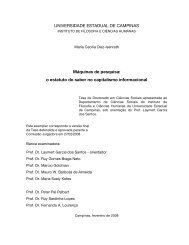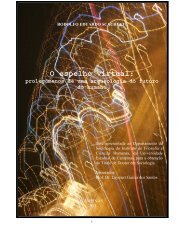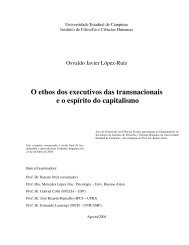As serpentes e o bastão: tecnociência, neoliberalismo e ... - CTeMe
As serpentes e o bastão: tecnociência, neoliberalismo e ... - CTeMe
As serpentes e o bastão: tecnociência, neoliberalismo e ... - CTeMe
You also want an ePaper? Increase the reach of your titles
YUMPU automatically turns print PDFs into web optimized ePapers that Google loves.
alanced debate in Parliament, resulting in carefully framed legislation.<br />
[...]<br />
But this isn't just about Government and science. Its crucially about society.<br />
We need better, stronger, clearer ways of science and people communicating.<br />
The dangers are in ignorance of each others point of view; the solution is<br />
understanding them.<br />
The fundamental distinction is between a process where science tells us the<br />
facts and we make a judgement; and a process where a priori judgements<br />
effectively constrain scientific research. We have the right to judge but we also<br />
have a right to know. A priori judgement branded Darwin a heretic; science<br />
proved his tremendous insight. So let us know the facts; then make the<br />
judgement as to how we use or act on them.<br />
None of this, incidentally, should diminish the precautionary principle.<br />
Responsible science and responsible policymaking operate on the<br />
precautionary principle. But that principle should make us proceed with care<br />
on the basis of fact; not fail to proceed at all on the basis of prejudice.<br />
[....] A small group can, as has happened in our country, destroy experimental<br />
crops before we can determine their environmental impact. [...]<br />
Of course there must be constraints that we properly place on scientists, [...]<br />
But if we had stopped all animal experiments in recent years we would not<br />
have developed a meningitis vaccine or combined drug therapy for HIV<br />
infection.<br />
[...] We cannot have vital work stifled simply because it is controversial.<br />
We need, therefore, a robust, engaging dialogue with the public. We need to reestablish<br />
trust and confidence in the way that science can demonstrate new<br />
opportunities, and offer new solutions.<br />
This task will be aided if we can embed a more mature attitude towards science<br />
in our society. I absolutely reject notions of two cultures. There is a deep<br />
human need to understand, and science has revealed so much of our<br />
extraordinary world. Science is a central part, not a separate part, of our<br />
common culture, together with art, history, the social sciences and the<br />
humanities.<br />
[...]<br />
We need to ensure our bright young people share our excitement about the<br />
potential of science and the role they can play. We particularly need to reverse<br />
the decline in maths, physics and engineering, and make science a career to<br />
aspire to, for girls as well as boys. [...] We have proposed a new National<br />
Centre of Excellence in Science Teaching. We have created a network of<br />
Science and Engineering Ambassadors to support science teachers. And we<br />
have provided £60m to refurbish school labs and modernise the learning<br />
infrastructure.<br />
[...] I want to make sure the UK is one of the best places in the world to do<br />
science. For that we need our people, equipment and infrastructure to be<br />
properly funded. And we should continue to promote British science abroad.<br />
[...] We need to ensure that Government, scientists and the public are fully<br />
engaged together in establishing the central role of science in building the<br />
world we want.<br />
If we can succeed in producing a confident relationship between scientists and<br />
the public, the promise is that Britain can be as much of a powerhouse of<br />
innovation - and its spin-offs - in the 21st century as we were in the 19th and<br />
early 20th century. The benefits in industry, jobs of quality, healthcare,<br />
education, and the environment can transform our future.<br />
[...] Let the debate be one between open minds, not a retreat into a culture of<br />
unreason. [...] We could choose a path of timidity in the face of the unknown.<br />
Or we could choose to be a nation at ease with radical knowledge, not fearful<br />
of the future, a culture that values a pragmatic, evidence-based approach to<br />
366<br />
Diálogo, compreensão<br />
mútua...<br />
A ciência é que deve dizer<br />
os fatos e depois julgamos.<br />
Não podem ser aceitos<br />
julgamentos “a priori”:<br />
sábios versus ignorantes e<br />
ideologia vs ciência...<br />
Preconceito, anti-ciência...<br />
Não pode perder o<br />
bonde...mesmo se o bonde<br />
é controvertido...<br />
Engajamento e diálogo<br />
servem... para recuperar a<br />
confiança. Depois, a<br />
ciência é que oferece<br />
soluções...<br />
Recrutar e seduzir: a TC<br />
precisa de talentos, e de<br />
operários...<br />
Mobilização total...<br />
Para a TC<br />
Confiança da população<br />
ajuda a inovação;<br />
O debate deve ser entre<br />
mentalidade “abertas”, não<br />
“irracionais”





